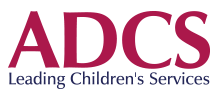
ADCS is a membership organisation, established in 2007, after the passing of the Children Act 2004.
Our members hold leadership roles in children’s services departments in local authorities in England. They specialise in developing, commissioning and leading the delivery of services to children, young people and their families, including education, health, youth, early years and social care services. Working in partnership with other agencies our members work to achieve tailored and joined-up services for children, whatever their identified needs.
ADCS is committed to the principles of equity, diversity, and inclusion which are fundamental to all areas of our work. We are committed to highlighting issues of disproportionality, discrimination and systemic barriers that limit opportunity where they exist, recognising that not all children, young people and families are impacted equally.
Our Values
ADCS and its members are committed to:
- A national framework for children’s services with clear lines of accountability and responsibility
- Local delivery of children’s services, accountable to local communities through the democratic process
- The promotion of research, innovation and learning across children’s services
- The promotion of equality and diversity in service delivery and in the children’s workforce
- Securing adequate and equitable funding to deliver and support the work of children’s services in every local authority
- Promoting improved outcomes for all children, young people and their families and carers so that they are healthy and safe, can enjoy and achieve in their education, make a positive contribution to society and achieve economic well-being.
What We Do
The Association is led by its members in all areas of policy and practice. Through the contributions of its members, ADCS provides the collective voice of professionals in children’s services leadership roles on policy, practice and resourcing of the wide variety of services available to children, young people and their families.
Within local government, ADCS is the professional contact point for children’s services issues with central government. The Association works closely with ministers, government officials, the community and voluntary sectors, local government organisations and other professional bodies on designing and delivering integrated services for children and young people.
ADCS’s work is undertaken through a comprehensive policy committee structure that spans the full remit of the statutory director of children’s services and through a welcoming regional branch structure. Through its national network of expert professional leaders, ADCS provides invaluable support and advice to colleagues.
Mentoring for new DCSs
The role of the DCS is perhaps the most challenging and highly scrutinised role in local government. Collectively, DCSs have an enormous amount of knowledge and experience in all aspects of children’s services. They are adept at working within the frameworks set by government and at delivering the services needed in their locality with care, consideration and innovation.
The ADCS Mentoring Scheme for new DCSs is the Association’s commitment to peer mentoring as a means of ensuring that each newly appointed DCS has access to the expertise of established DCSs; to open dialogue between colleagues; and, to encourage DCSs to seek advice and counsel from each other. The Mentoring Scheme extends to all new DCSs - interim and substantive post-holders - and Chief Executives of alternative delivery models (ADMs) such as children’s services trusts or social enterprises.
The Mentoring Scheme is a benefit of membership of the Association and should be seen as being complementary to induction programmes offered by individual local authorities. The scheme is not prescriptive in any way – it is designed to provide new DCSs with an introduction to a supportive network of peers.
A great deal of the work carried out by a DCS, like any other systems leader, is the unseen work which keeps the wheels turning. DCS colleagues who have been mentored, or served as mentors, have stressed that having a fellow DCS to act as a sounding board for how to balance the relationships with colleagues, partners and politicians in local government, is critical.
Whilst the scheme is not compulsory, we strongly encourage all new DCSs to take up the offer of support from an established DCS colleague.
For more information contact gary.dumbarton@adcs.org.uk
How we work
There are three types of membership: Ordinary, Associate and Honorary. ADCS currently has around 1900 members from across all English top tier LAs.
As a Limited company, ADCS has a Board of Directors responsible for directing the Association’s affairs and managing the business of the Association. All Directors must be statutory DCSs with the exception of the four elected director posts, traditionally ADCS has encouraged nominations from non-DCSs into these roles as part of DCS succession planning.
The ADCS Council of Reference brings together our Board of Directors, policy committee chairs, regional chairs and vice chairs, and the chair of the Associates network. The principal purpose of the Council of Reference is to act as a consultative body, advising the Board of Directors as required, on behalf of the wider membership.
The six national policy committees cover the totality of children’s services policy.
Each of the nine regions have their own support and project staff, have different structures and networks covering the breadth of children’s services. The established links between regions and national activity is via Council of Reference and the policy committees.
The website
The ADCS website provides an overview of our work and hosts a range of resources on behalf of, and for, ADCS members and their wider teams.
Please use the search box at the top of each page or the tag cloud to find content across the site. If you cannot find what you are looking for, please contact is at info@adcs.org.uk


